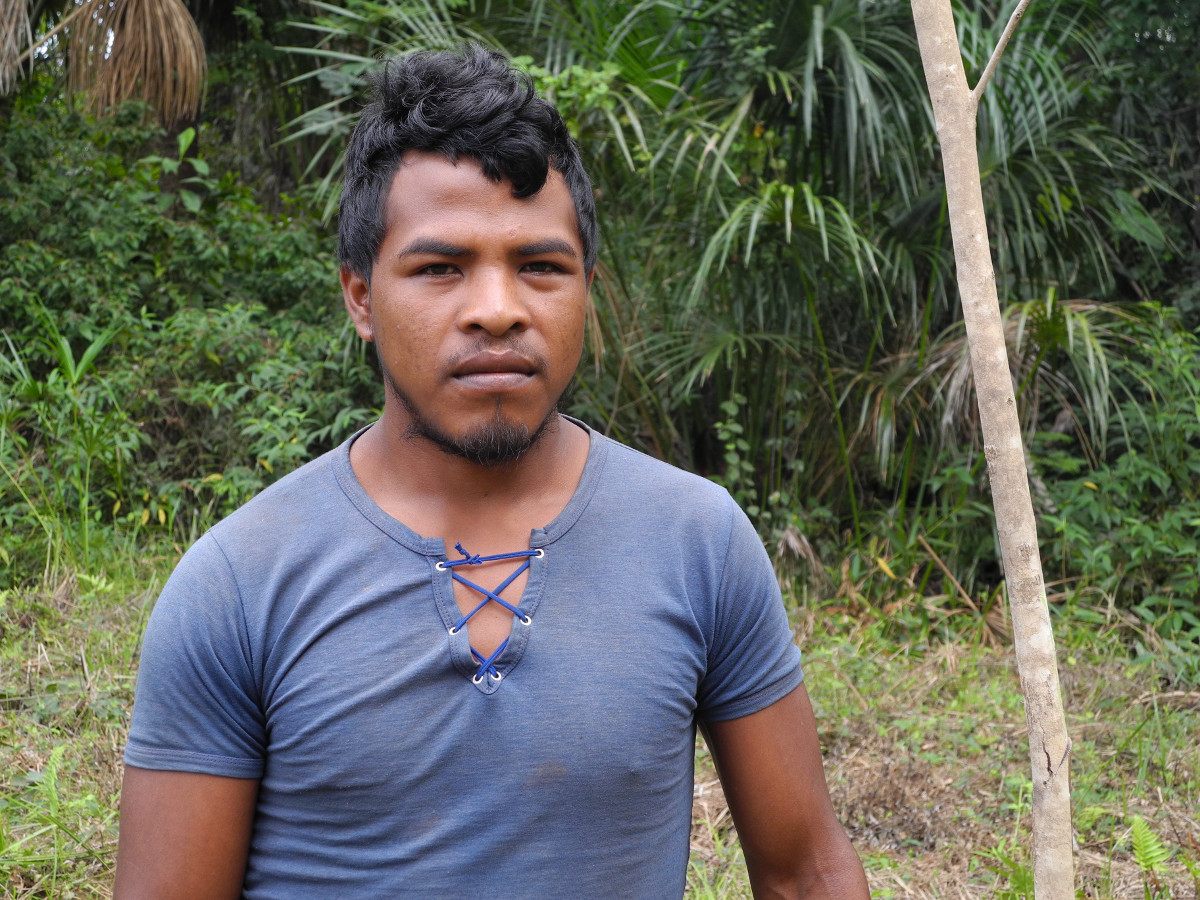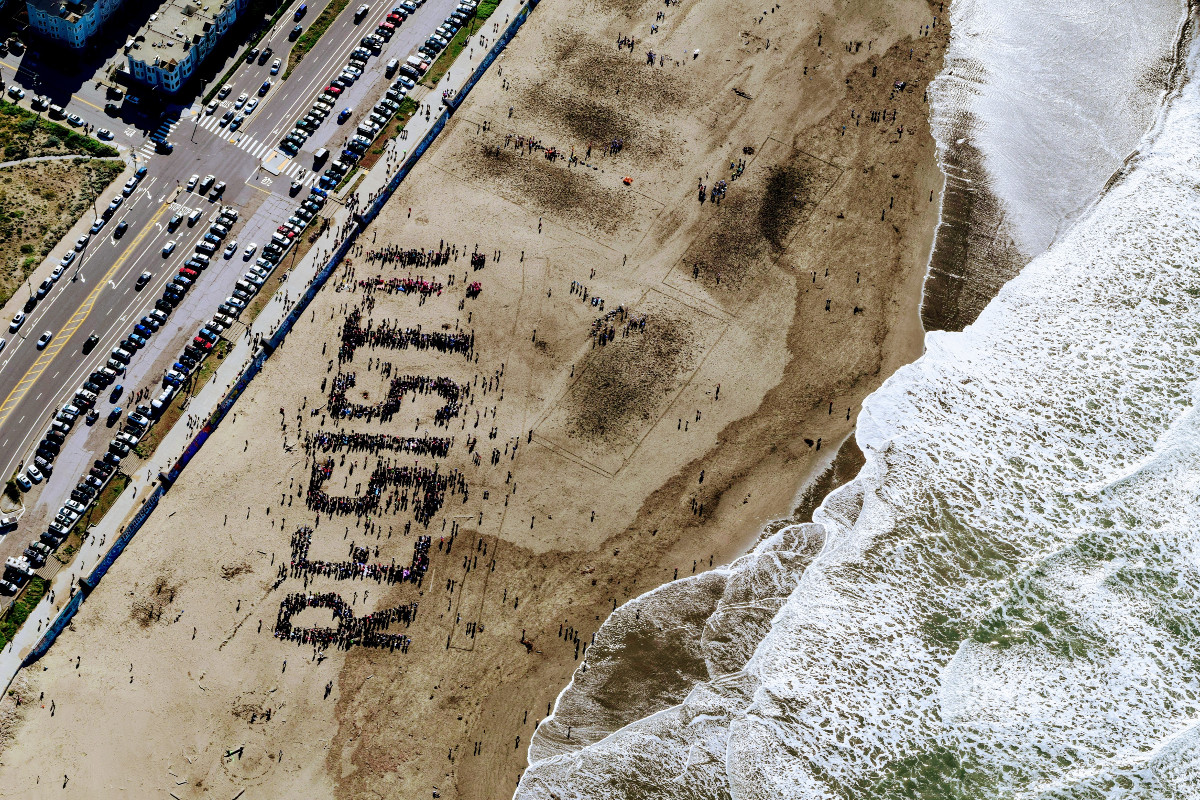
Culture of Resistance: Ecofascism and Lessons from the German Experience
This excerpt from Chapter 4 of the book Deep Green Resistance: Strategy to Save the Planet was written by Lierre Keith. Click the link above to purchase the book or read online for free.
Tell me, what is it you plan to do
with your one wild and precious life?
—Mary Oliver, poet
The culture of the left needs a serious overhaul. At our best and bravest moments, we are the people who believe in a just world; who fight the power with all the courage and commitment that women and men can possess; who refuse to be bought or beaten into submission, and refuse equally to sell each other out. The history of struggles for justice is inspiring, ennobling even, and it should encourage us to redouble our efforts now when the entire world is at stake. Instead, our leadership is leading us astray. There are historic reasons for the misdirection of many of our movements, and we would do well to understand those reasons before it’s too late.1
The history of misdirection starts in the Middle Ages when various alternative sects arose across Europe, some more strictly religious, some more politically utopian. The Adamites, for instance, originated in North Africa in the second century, and the last of the Neo-Adamites were forcibly suppressed in Bohemia in 1849.2 They wanted to achieve a state of primeval innocence from sin. They practiced nudism and ecstatic rituals of rebirth in caves, rejected marriage, and held property communally. Groups such as the Diggers (True Levelers) were more political. They argued for an egalitarian social structure based on small agrarian communities that embraced ecological principles. Writes one historian, “They contended that if only the common people of England would form themselves into self-supporting communes, there would be no place in such a society for the ruling classes.”3
Not all dissenting groups had a political agenda. Many alternative sects rejected material accumulation and social status but lacked any clear political analysis or egalitarian program. Such subcultures have repeatedly arisen across Europe, coalescing around a common constellation of themes:
■ A critique of the dogma, hierarchy, and corruption of organized religion;
■ A rejection of the moral decay of urban life and a belief in the superiority of rural life;
■ A romantic or even sentimental appeal to the past: Eden, the Golden Age, pre-Norman England;
■ A millenialist bent;
■ A spiritual practice based on mysticism; a direct rather than mediated experience of the sacred. Sometimes this is inside a Christian framework; other examples involve rejection of Christianity. Often the spiritual practices include ecstatic and altered states;
■ Pantheism and nature worship, often concurrent with ecological principles, and leading to the formation of agrarian communities;
■ Rejection of marriage. Sometimes sects practice celibacy; others embrace polygamy, free love, or group marriage.
Within these dissenting groups, there has long been a tension between identifying the larger society as corrupt and naming it unjust. This tension has been present for over 1,000 years. Groups that critique society as degenerate or immoral have mainly responded by withdrawing from society. They want to make heaven on Earth in the here and now, abandoning the outside world. “In the world but not of it,” the Shakers said. Many of these groups were and are deeply pacifistic, in part because the outside world and all things political are seen as corrupting, and in part for strongly held moral reasons. “Corruption groups” are not always leftist or progressive. Indeed, many right-wing and reactionary elements have formed sects and founded communities. In these groups, the sin in urban or modern life is hedonism, not hierarchy. In fact, these groups tend to enforce strict hierarchy: older men over younger men, men over women. Often they have a charismatic leader and the millenialist bent is quite marked.
“Justice groups,” on the other hand, name society as inequitable rather than corrupt, and usually see organized religion as one more hierarchy that needs to be dismantled. They express broad political goals such as land reform, pluralistic democracy, and equality between the sexes. These more politically oriented spiritual groups walk the tension between withdrawal and engagement. They attempt to create communities that support a daily spiritual practice, allow for the withdrawal of material participation in unjust systems of power, and encourage political activism to bring their New Jerusalem into being. Contemporary groups like the Catholic Workers are attempts at such a project.
This perennial trend of critique and utopian vision was bolstered by Romanticism, a cultural and artistic movement that began in the latter half of the eighteenth century in Western Europe. It was at least partly a reaction against the Age of Enlightenment, which valued rationality and science. The image of the Enlightenment was the machine, with the living cosmos reduced to clockwork. As the industrial revolution gained strength, rural lifeways were destroyed while urban areas swelled with suffering and squalor. Blake’s dark, Satanic mills destroyed rivers, the commons of wetlands and forests fell to the highest bidder, and coal dust was so thick in London that the era could easily be deemed the Age of Tuberculosis. In Germany, the Rhine and the Elbe were killed by dye works and other industrial processes. And along with natural communities, human communities were devastated as well.
Romanticism revolved around three main themes: longing for the past, upholding nature as pure and authentic, and idealizing the heroic and alienated individual. Germany, where elements of an older pagan folk culture still carried on, was in many ways the center of the Romantic movement.
How much of this Teutonic nature worship was really drawn from surviving pre-Christian elements, and how much was simply a Romantic recreation—the Renaissance Faire of the nineteenth century—is beyond the scope of this book. Suffice it to say, there were enough cultural elements for the Romantics to build on.
In 1774, German writer Goethe penned the novel The Sorrows of Young Werther, the story of a young man who visits an enchanting peasant village, falls in love with an unattainable young woman, and suffers to the point of committing suicide. The book struck an oversensitive nerve, and, overnight, young men across Europe began modeling themselves on the protagonist, a depressive and passionate artist. Add to this the supernatural and occult elements of Edgar Allan Poe’s work, and, by the nineteenth century, the Romantics of that day resembled modern Goths. A friend of mine likes to say that history is same characters, different costumes—and in this case the costumes haven’t even changed much.4
Another current of Romanticism that eventually influenced our current situation was bolstered by philosopher Jean Jacques Rosseau,5 who described a “state of nature” in which humans lived before society developed. He was not the creator of the image of the noble savage—that dubious honor falls to John Dryden, in his 1672 play The Conquest of Granada. Rousseau did, however, popularize one of the core components that would coalesce into the cliché, arguing that there was a fundamental rupture between human nature and human society. The concept of such a divide is deeply problematical, as by definition it leaves cultures that aren’t civilizations out of the circle of human society. Whether the argument is for the bloodthirsty savage or the noble savage, the underlying concept of a “state of nature” places hunter-gatherers, horticulturalists, nomadic pastoralists, and even some agriculturalists outside the most basic human activity of creating culture. All culture is a human undertaking: there are no humans living in a “state of nature.”6 With the idea of a state of nature, vastly different societies are collapsed into an image of the “primitive,” which exists unchanging outside of history and human endeavor.
Indeed, one offshoot of Romanticism was an artistic movement called Primitivism that inspired its own music, literature, and art. Romanticism in general and Primitivism in particular saw European culture as overly rational and repressive of natural impulses. So-called primitive cultures, in contrast, were cast as emotional, innocent and childlike, sexually uninhibited, and at one with the natural world. The Romantics embraced the belief that “primitives” were naturally peaceful; the Primitivists tended to believe in their proclivity to violence. Either cliché could be made to work because the entire image is a construct bearing no relation to the vast variety of forms that indigenous human cultures have taken. Culture is a series of choices—political choices made by a social animal with moral agency. Both the noble savage and the bloodthirsty savage are objectifying, condescending, and racist constructs.
Romanticism tapped into some very legitimate grievances. Urbanism is alienating and isolating. Industrialization destroys communities, both human and biotic. The conformist demands of hierarchical societies leave our emotional lives inauthentic and numb, and a culture that hates the animality of our bodies drives us into exile from our only homes. The realization that none of these conditions are inherent to human existence or to human society can be a profound relief. Further, the existence of cultures that respect the earth, that give children kindness instead of public school, that share food and joy in equal measure, that might even have mystical technologies of ecstasy, can serve as both an inspiration and as evidence of the crimes committed against our hearts, our culture, and our planet. But the places where Romanticism failed still haunt the culture of the left today and must serve as a warning if we are to build a culture of resistance that can support a true resistance movement.
In Germany, the combination of Romanticism and nationalism created an upswell of interest in myths. They spurred a widespread longing for an ancient or even primordial connection with the German landscape. Youth are the perennially disaffected and rebellious, and German youth in the late nineteenth century coalesced into their own counterculture. They were called Wandervogel or wandering spirits. They rejected the rigid moral code and work ethic of their bourgeois parents, romanticized the image of the peasant, and wandered the countryside with guitars and rough-spun tunics. The Wandervogel started with urban teachers taking their students for hikes in the country as part of the Lebensreform (life reform) movement. This social movement emphasized physical fitness and natural health, experimenting with a range of alternative modalities like homeopathy, natural food, herbalism, and meditation. The Lebensreform created its own clinics, schools, and intentional communities, all variations on a theme of reestablishing a connection with nature. The short hikes became weekends; the weekends became a lifestyle. The Wandervogel embraced the natural in opposition to the artificial: rural over urban, emotion over rationality, sunshine and diet over medicine, spontaneity over control. The youth set up “nests” and “antihomes” in their towns and occupied abandoned castles in the forests. The Wandervogel was the origin of the youth hostel movement. They sang folk songs; experimented with fasting, raw foods, and vegetarianism; and embraced ecological ideas—all before the year 1900. They were the anarchist vegan squatters of the age.
Environmental ideas were a fundamental part of these movements. Nature as a spiritual source was fundamental to the Romantics and a guiding principle of Lebensreform. Adolph Just and Benedict Lust were a pair of doctors who wrote a foundational Lebensreform text, Return to Nature, in 1896. In it, they decried,
Man in his misguidance has powerfully interfered with nature. He has devastated the forests, and thereby even changed the atmospheric conditions and the climate. Some species of plants and animals have become entirely extinct through man, although they were essential in the economy of Nature. Everywhere the purity of the air is affected by smoke and the like, and the rivers are defiled. These and other things are serious encroachments upon Nature, which men nowadays entirely overlook but which are of the greatest importance, and at once show their evil effect not only upon plants but upon animals as well, the latter not having the endurance and power of resistance of man.7
Alternative communities soon sprang up all over Europe. The small village of Ascona, Switzerland, became a countercultural center between 1900 and 1920. Experiments involved “surrealism, modern dance, dada, Paganism, feminism, pacifism, psychoanalysis and nature cure.”8 Some of the figures who passed through Ascona included Carl Jung, Isadora Duncan, Mikhail Bakunin, Peter Kropotkin, Vladimir Lenin, Leon Trotsky, and an alcoholic Herman Hesse seeking a cure. Clearly, social change—indeed, revolution—was one of the ideas on the table at Ascona. This chaos of alternative spiritual, cultural, and political trends began to make its way to the US. On August 20, 1903, for instance, an anarchist newspaper in San Francisco published a long article describing the experiments underway at Ascona.
As we will see, the connections between the Lebensreform, Wandervogel youth, and the 1960s counterculture in the US are startlingly direct. German Eduard Baltzer wrote a lengthy explication of naturliche lebensweise (natural lifestyle) and founded a vegetarian community. Baltzer-inspired painter Karl Wihelm Diefenbach, who also started a number of alternative communities and workshops dedicated to religion, art, and science, all based on Lebensreform ideas. Artists Gusto Graser and Fidus pretty well created the artistic style of the German counterculture in the late nineteenth and early twentieth centuries. Viewers of their work would be forgiven for thinking that their paintings of psychedelic colors, swirling floraforms, and naked bodies embracing were album covers circa 1968. Fidus even used the iconic peace sign in his art.
Graser was a teacher and mentor to Herman Hesse, who was taken up by the Beatniks. Siddhartha and Steppenwolf were written in the 1920s but sold by the millions in the US in the 1960s. Declares one historian, “Legitimate history will always recount Hesse as the most important link between the European counter-culture of his [Hesse’s] youth and their latter-day descendants in America.”9
Along with a few million other Europeans, some of the proponents of the Wandervogel and Lebensreform movements immigrated to the United States at the beginning of the twentieth century. The most famous of these Lebensreform immigrants was Dr. Benjamin Lust, deemed the Father of Naturopathy, quoted previously. Write Gordon Kennedy and Kody Ryan, “Everything from massage, herbology, raw foods, anti-vivisection and hydro-therapy to Eastern influences like Ayurveda and Yoga found their way to an American audience through Lust.”10 In Return To Nature, he railed against water and air pollution, vivisection, vaccination, meat, smoking, alcohol, coffee, and public schooling. Any of this sound a wee bit familiar? Gandhi, a fan, was inspired by Lust’s principles to open a Nature Cure clinic in India.
The emphasis on sunshine and naturism led many of these Lebensreform immigrants to move to warm, sunny California and Florida. Sun worship was embraced as equal parts ancient Teutonic religion, health-restoring palliative, and body acceptance. It was much easier to live outdoors and scrounge for food where the weather never dropped below freezing. Called Nature Boys, naturemensch, and modern primitives, they set up camp and began attracting followers and disciples. German immigrant Arnold Ehret, for instance, wrote a number of books on fasting, raw foods, and the health benefits of nude sunbathing, books that would become standard texts for the San Francisco hippies. Gypsy Boots was another direct link from the Lebensreform to the hippies. Born in San Francisco, he was a follower of German immigrant Maximillian Sikinger. After the usual fasting, hiking, yoga, and sleeping in caves, he opened his “Health Hut” in Los Angeles, which was surprisingly successful. He was also a paid performer at music festivals like Monterey and Newport in 1967 and 1968, appearing beside Jefferson Airplane, Jimi Hendrix, and the Grateful Dead. Carolyn Garcia, Jerry’s wife, was apparently a big admirer. Boots was also in the cult film Mondo Hollywood with Frank Zappa.
The list of personal connections between the Wandervogel Nature Boys and the hippies is substantial, and makes for an unbroken line of cultural continuity. But before we turn to the 1960s, it’s important to examine what happened to the Lebensreform and Wandervogel in Germany with the rise of Nazism.
This is not easy to do. Fin de siècle Germany was a tumult of change and ideas, pulling in all directions. There was a huge and politically powerful socialist party, the Sozialdemokratische Partei Deutschlands (Social Democratic Party of Germany), or SPD, which one historian called “the pride of the Second International.”11 In 1880, it garnered more votes than any other party in Germany, and, in 1912, it had more seats in Parliament than any other party. It helped usher in the first parliamentary democracy, including universal suffrage, and brought a shorter workday, legal workers’ councils in industry, and a social safety net. To these serious activists, the Wandervogel and Lebensreform, especially “the more manifestly idiotic of these cults,”12 were fringe movements. To state the obvious, the constituents of SPD were working-class and poor people concerned with survival and justice, while the Lebensreform, with their yoga, spiritualism, and dietary silliness, were almost entirely middle class.
Here we begin to see these utopian ideas take a sinister turn. The seeds of contradiction are easy to spot in the völkisch movement entry on Wikipedia, which states, “The völkisch movement is the German interpretation of the populist movement, with a romantic focus on folklore and the ‘organic.’ . . . In a narrow definition it can be used to designate only groups that consider human beings essentially preformed by blood, i.e. inherited character.”
Immediately, there are problems. The völkisch is marked with a Nazi tag. One Wikipedian writes, “Personally I consider it offensive to claim that an ethnic definition of ‘Folk’ equals Nationalism and/or Racism.” Another Wikipedian points out that the founders of the völkisch concept were leftist thinkers. Another argues, “With regard to its origins . . . the völkisch idea is wholeheartedly non-racist, and people like Landauer and Mühsam (the leading German anarchists of their time) represented a continuing current of völkisch anti-racism. It’s understandable if the German page focuses on the racist version—a culture of guilt towards Romanticism seems to be one of Hitler’s legacies—but these other aspects need to be looked at too.”13
Who is correct? Culture, ethnicity, folklore, and nationalism are all strands that history has woven into the word. But völk does have a first philosopher, Johann Gottfried von Herder, who founded the whole idea of folklore, of a culture of the common people that should be valued, not despised. He urged Germans to take pride in their language, stories, art, and history. The populist appeal in his ideas—indeed, their necessity to any popular movement—may seem obvious to us 200 years later, but at the time this valuing of a people’s culture was new and radical. His personal collection of folk poetry inspired a national hunger for folklore; the brothers Grimm were one direct result of Herder’s work. He also argued that everyone from the king to the peasants belonged to the völk, a serious break with the ruling notion that only the nobility were the inheritors of culture and that that culture should emulate classical Greece. He believed that his conception of the völk would lead to democracy and was a supporter of the French Revolution.
Herder was very aware of where the extremes of nationalism could lead and argued for the full rights of Jews in Germany. He rejected racial concepts, saying that language and culture were the distinctions that mattered, not race, and asserted that humans were all one species. He wrote, “No nationality has been solely designated by God as the chosen people of the earth; above all we must seek the truth and cultivate the garden of the common good.”14
Another major proponent of leftist communitarianism was Gustav Landauer, a Jewish German. He was one of the leading anarchists through the Wilhelmine era until his death in 1919 when he was arrested by the Freikorps and stoned to death. He was a mystic as well as being a political writer and activist. His biographer, Eugene Lunn, describes Landauer’s ideas as a “synthesis of völkisch romanticism and libertarian socialism,” hence, “romantic socialism.”15 He was also a pacifist, rejecting violence as a means to revolution both individually and collectively. His belief was that the creation of libertarian communities would “gradually release men and women from their childlike dependence upon authority,” the state, organized religion, and other forms of hierarchy.16 His goal was to build “radically democratic, participatory communities.”17
Landauer spoke to the leftist writers, artists, intellectuals, and youths who felt alienated by modernity and urbanism and expressed a very real need—emotional, political, and spiritual—for community renewal. He had a full program for the revolutionary transformation of society. Rural communes were the first practical step toward the end of capitalism and exploitation. These communities would form federations and work together to create the infrastructure of a new society based on egalitarian principles. It was an A to B plan that never lost sight of the real conditions of oppression under which people were living. After World War I, roughly one hundred communes were formed in Germany, and, of those, thirty were politically leftist, formed by anarchists or communists. There was also a fledgling women’s commune movement whose goal was an autonomous feminist culture, similar to the contemporary lesbian land movement in the US.
Where did this utopian resistance movement go wrong? The problem was that it was, as historian Peter Weindling puts it, “politically ambivalent.”18 Writes Weindling, “The outburst of utopian social protest took contradictory artistic, Germanic volkish, or technocratic directions.”19 Some of these directions, unhitched from a framework of social justice, were harnessed by the right, and ultimately incorporated into Nazi ideology. Lebensreform activities like hiking and eating whole-grain bread were seen as strengthening the political body and were promoted by the Nazis. “A racial concept of health was central to National Socialism,” writes Weindling. Meanwhile, Jews, gays and lesbians, the mentally ill, and anarchists were seen as “diseases” that weakened the Germanic race as a whole.
Ecological ideas were likewise embraced by the Nazis. The health and fitness of the German people—a primary fixation of Nazi culture—depended on their connection to the health of the land, a connection that was both physical and spiritual. The Nazis were a peculiar combination of the Romantic and the Modern, and the backward-looking traditionalist and the futuristic technotopians were both attracted to their ideology. The Nazi program was as much science as it was emotionality. Writes historian David Blackborn,
National socialism managed to reconcile, at least theoretically, two powerful and conflicting impulses of the later nineteenth century, and to benefit from each. One was the infatuation with the modern and the technocratic, where there is evident continuity from Wilhelmine Germany to Nazi eugenicists and Autobahn builders; the other was the “cultural revolt” against modernity and machine-civilization, pressed into use by the Nazis as part of their appeal to educated élites and provincial philistines alike.20
Let’s look at another activist of the time, one who was political. Erich Mühsam, a German Jewish anarchist, was a writer, poet, dramatist, and cabaret performer. He was a leading radical thinker and agitator during the Weimar Republic, and won international acclaim for his dramatic work satirizing Hitler. He had a keen interest in combining anarchism with theology and communal living, and spent time in the alternative community of Ascona. Along with many leftists, he was arrested by the Nazis and sent to concentration camps in Sonnenburg, Brandenburg, and finally Oranienburg. Intellectuals around the world protested and demanded Mühsam’s release, to no avail. When his wife Zenzl was allowed to visit him, his face was so bruised she didn’t recognize him. The guards beat and tortured him for seventeen months. They made him dig his own grave. They broke his teeth and burned a swastika into his scalp. Yet when they tried to make him sing the Nazi anthem, he would sing the International instead. At his last torture session, they smashed in his skull and then killed him by lethal injection. They finished by hanging his body in a latrine.
The intransigent aimlessness and anemic narcissism of so much of the contemporary counterculture had no place beside the unassailable courage and sheer stamina of this man. Sifting through this material, I will admit to a certain amount of despair: between the feckless and the fascist, will there ever be any hope for this movement? The existence of Erich Mühsam is an answer to embrace. Likewise, reading history backwards, so that Nazis are preordained in the völkish idea, is insulting to the inheritors of this idea who resisted Fascism with Mühsam’s fortitude. There were German leftists who fought for radical democracy and justice, not despite their communitarianism, but with it.
Our contemporary environmental movement has much to learn from this history. Janet Biehl and Peter Staudenmaier, in their book Ecofascism: Lessons from the German Experience,21 explore the idea that fascism or other reactionary politics are “perhaps the unavoidable trajectory of any movement which acknowledges and opposes social and ecological problems but does not recognize their systemic roots or actively resist the political and economic structures which generate them. Eschewing societal transformation in favor of personal change, an ostensibly apolitical disaffection can, in times of crisis, yield barbaric results.”22
The contemporary alterna-culture won’t result in anything more sinister than silliness; fascism in the US is most likely to come from actual right-wing ideologues mobilizing the resentments of the disaffected and economically stretched mainstream, not from New Age workshop hoppers. And friends of Mary Jane aren’t known for their virulence against anything besides regular bathing. German immigrants brought the Lebensreform and Wandervogel to the US, and it didn’t seed a fascist movement here. None of this leads inexorably to fascism. But we need to take seriously the history of how ideas which we think of as innately progressive, like ecology and animal rights, became intertwined with a fascist movement.
An alternative culture built around the project of an individualistic and interior experience, whether spiritual or psychological, cannot create a resistance movement, no matter how many societal conventions it trespasses. Indeed, the Wandervogel manifesto stated, “We regard with contempt all who call us political,”23 and their most repeated motto was “Our lack of purpose is our strength.” But as Laqueur points out,
Lack of interest in public affairs is not civic virtue, and . . . an inability to think in political categories does not prevent people from getting involved in political disaster . . . The Wandervogel . . . completely failed. They did not prepare their members for active citizenship. . . . Both the socialist youth and the Catholics had firmer ground under their feet; each had a set of values to which they adhered. But in the education of the free youth movement there was a dangerous vacuum all too ready to be filled by moral relativisim and nihilism.24
We are facing another disaster, and if we fail there will be no future to learn from our mistakes. That same “lack of interest”—often a stance of smug alienation—is killing our last chance of resistance. We are not preparing a movement for active citizenship and all that implies—the commitment, courage, and sacrifice that real resistance demands. There is no firm moral ground under the feet of those who can only counsel withdrawal and personal comfort in the face of atrocity. And the current Wandervogel end in nihilism as well, repeating that it’s over, we can do nothing, the human race has run its course and the bacteria will inherit the earth. The parallels are exact. And the outcome?
The Wandervogel marched off to World War I, where they “perished in Flanders and Verdun.”25 Of those who returned from the war, a small, vocal minority became communists. A larger group embraced right-wing protofascist groups. But the largest segment was apolitical and apathetic. “This was no accidental development,” writes Laqueur.26
The living world is now perishing in its own Flanders and Verdun, a bloody, senseless pile of daily species. Today there are still wood thrushes, small brown angels of the deep woods. Today there are northern leopard frogs, but only barely. There may not be Burmese star tortoises, with their shells like golden poinsettias; the last time anyone looked—for 400 hours with trained dogs—they only found five. If the largest segment of us remains apolitical and apathetic, they we’ll all surely die.
Part II will be published next week. For references, visit this link to read the book Deep Green Resistance: Strategy to Save the Planet online or to purchase a copy.





